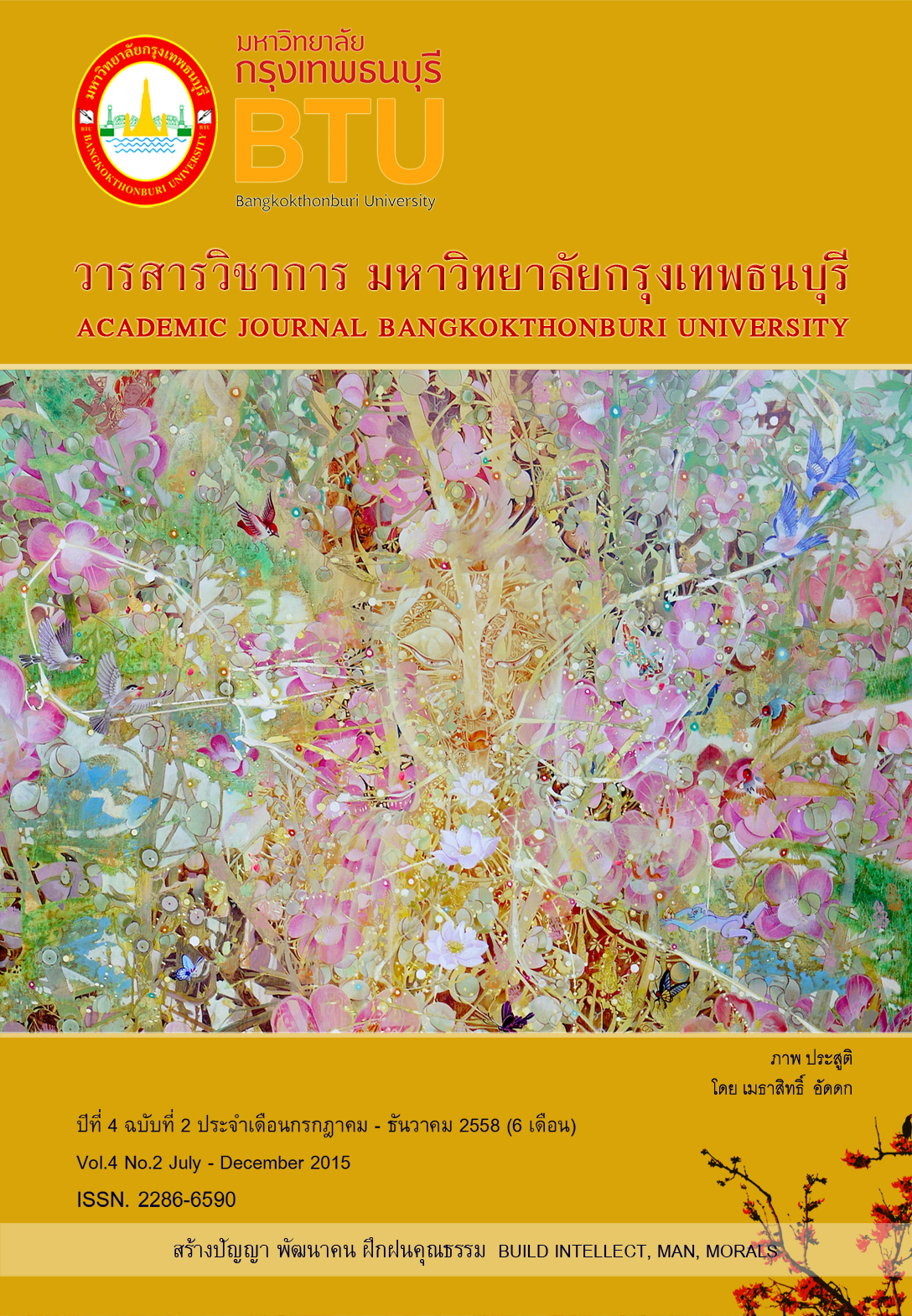พฤติกรรมการสื่อสารในครอบครัวที่ส่งผลต่อการเรียนรู้ในชั้นเรียนของนักเรียนโรงเรียนบางยี่ขันวิทยาคมกรุงเทพมหานคร
Main Article Content
Abstract
บทคัดย่อ
การวิจัยนี้มีวัตถุประสงค์ 1) เพื่อศึกษาพฤติกรรมการสื่อสารในครอบครัวที่มีผลต่อการเรียนรู้ในชั้นเรียนของนักเรียนโรงเรียนบางยี่ขันวิทยาคมกรุงเทพมหานคร 2) เพื่อศึกษาผลการเรียนรู้ในชั้นเรียนที่มีผลต่อพฤติกรรมการสื่อสารในครอบครัวของนักเรียนโรงเรียนบางยี่ขันวิทยาคม 3) เพื่อศึกษาแนวทางการสื่อสารในครอบครัวไปสู่การพัฒนาการเรียนรู้ในชั้นเรียนของนักเรียนโรงเรียนบางยี่ขันวิทยาคม 4) เพื่อศึกษาปัจจัยที่ส่งผลให้เกิดปัญหาในการสื่อสารภายในครอบครัว โดยใช้วิธีการวิจัยเชิงคุณภาพกับกลุ่มตัวอย่าง ได้แก่ นักเรียนโรงเรียนบางยี่ขันวิทยาคม แบ่งออกเป็น 2 กลุ่ม ได้แก่ กลุ่มที่มีพฤติกรรมการสื่อสารในครอบครัวในแง่บวกและแง่ลบ โดยผู้วิจัยใช้วิธีสัมภาษณ์แบ่งเป็น 2 ลักษณะ ได้แก่ 1.การสัมภาษณ์แบบเจาะลึกประกอบด้วย นักเรียน ผู้ปกครอง และครู ทั้ง 2 กลุ่ม จำนวน 36 คน 2.การสัมภาษณ์แบบกลุ่มประกอบด้วย นักเรียนระดับชั้นมัธยมศึกษาตอนต้น ทั้ง 2 กลุ่ม จำนวน 12 คน รวมการสัมภาษณ์ทั้งสิ้น จำนวน 48 คน ซึ่งผลการวิจัยพบว่า
1) พฤติกรรมการสื่อสารในครอบครัวนั้นมีผลต่อการเรียนรู้ในชั้นเรียนของนักเรียนเป็นอย่างมาก เพราะกระบวนการสื่อสารเป็นการส่งเสริมความเข้าใจร่วมกันทำให้เด็กมีความพร้อมที่จะเรียนรู้ในชั้นเรียนต่อไป
2) ผลการเรียนรู้ในชั้นเรียนมีผลทำให้พฤติกรรมการสื่อสารในครอบครัวของเด็กมีการเปลี่ยนแปลงเกิดขึ้นซึ่งแตกต่างกันไปในแต่ละครอบครัว 3) การสื่อสารในครอบครัวนำไปสู่การพัฒนาการเรียนรู้ในชั้นเรียนของนักเรียนผู้วิจัยได้เสนอแนวทางการสื่อสารในครอบครัว โดยใช้รูปแบบสนับสนุนความคิดเห็นของเด็กเป็นหลัก (Pluralistic) และแบบประนีประนอม(consensual) ซึ่งเป็นแนวความคิดที่เปิดกว้าง ทำให้เด็กกล้าที่จะแสดงความคิดเห็นของตนเองให้พ่อแม่หรือผู้ปกครองได้รับรู้ 4) ปัจจัยที่ทำให้เกิดปัญหาในการสื่อสารภายในครอบครัว ได้แก่ จำนวนสมาชิกในครอบครัว อาชีพของผู้ปกครอง สถานภาพของผู้ปกครอง รายได้หมุนเวียนในครัวเรือนโดยปัญหาที่เกิดขึ้นส่งผลกระทบต่อการเรียนรู้ของเด็ก ทำให้เวลาในการสื่อสารกับครอบครัวลดน้อยลง
Abstract
The objectives of the study were threefold: 1) to invertigate the effect of family communicative behaviors on the students’ learning performance, 2) to determine the students’ learning achievements affecting the family communicative behaviors of the students, 3) to study of family communicative approach leading to the development of the student learning performance at Bangyikhan Wittayakhom School and 4) to forrest out the factors impeding and impairing the family communication.
The study was qualitative in nature. The sample was comprised of two groups of the students ; the first group had positive communication in the family, whereas the second group had negative communication in the family. To obtain the needed data for the study, the researcher resorted to in-depath interviews and focus group interviews 32 parents and teachers were in-depath interviewed, meanwhile 48 secondary school students were used for focus group interviews. as a result of the qualitative data analysis, the researcher has discovered the facts specified below. 1) The family communicative behaviors had great effect on the students’ learning performance largely became the communication process helped promote the common understanding and made the students ready for learning in the classroom. 2) The students’ learning achievement brought about change in the family communicative behaviors. 3) The family communicative behaviors were conducive to the classroom learning development of the students. and 4) The factor giving rise to the family communication problems included the following : member of family members, occupation of parents, and the social-economic status of the family.


